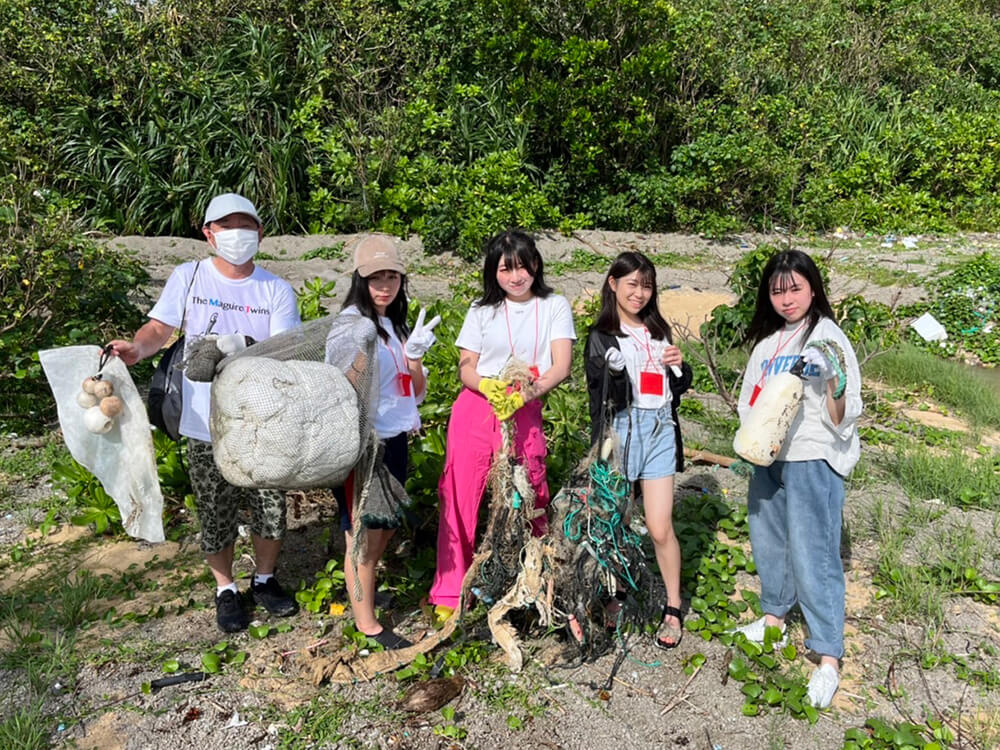Education for Sustainable Development Programs in Japan:
Recycling Marine Debris Through the Yaeyama Beach Clean Project
As communities around the world embrace efforts to become more sustainable, there has been a heightened interest in Education for Sustainable Development (ESD). Sustainability is a crucial theme and it is especially important for the next generation to take steps to protect the environment. In Japan, there has been a growing number of efforts to promote ESD.
Learn more about ESD programs that can be incorporated into educational travel.

Vast amounts of garbage dragged by ocean currents wash up on the Yaeyama Islands, the westernmost archipelago in Okinawa Prefecture. This region receives the largest volume of waste in the entire prefecture, and in recent years, disposal has become a serious problem.
To help deal with this issue, three companies involved in environmental protection efforts teamed up in 2021 to launch Tourism for Tomorrow -Yaeyama Beach Clean Project-. What makes this initiative unique is that it adopts a circular system that goes beyond ordinary volunteer beach cleanups. It is incorporated as a part of educational travel programs such as high school excursions as well as corporate training in the hopes that it will encourage the next generation to take environmental matters into their own hands.
A collaborative project between a textile manufacturer, environmental protection business, travel agency, and local government
The Yaeyama Beach Clean Project is planned and implemented by a major travel agency involved in SDGs-related businesses. The beach cleanup tours themselves are conducted by an Ishigaki city-based company engaged in local protection efforts.
Waste plastic bottles collected from the beach are purchased by a textile manufacturer based in Aichi Prefecture, which processes them into textile fibers. They are then transformed into t-shirts and pouches to be given to the beach cleanup participants. The city of Ishigaki plays an indispensable role in the project as it collects, compresses, and stores the trash from the beach clean ups.
This initiative aims to reduce the burden on local governments to collect and dispose of marine garbage through recycling. By providing learning opportunities like this, it hopes to contribute to fostering a more environmentally conscious society.

Pre-departure lecture on marine litter
High school students scheduled to participate in a beach cleanup tour, for instance, first learn about marine debris in the Yaeyama Islands prior to their departure. Local stakeholders communicate to the students online or via video letters about the impact of plastic pollution on the ocean and marine life and how tour companies conduct beach cleanups to preserve the local landscape. They also talk about how Ishigaki City is in a unique predicament as a remote island as it lacks sufficient incineration facilities or recycling mechanisms, so it has to landfill the marine debris. Disposal requires extensive help from volunteers and costs large amounts of tax money. Students tend to have the impression that the sea around the Yaeyama Islands is pristine, so it shocks them to see garbage overflowing onto the shoreline.

Experiencing the recycling process firsthand
On the day of the beach cleanup, operators first check the condition of the beach and decide on the method of collection. Participants pick up garbage with baskets and plastic bags in hand. Glass shards and syringes tend to be present, so sneakers and work gloves are essential. The trash is collected in one place and sorted according to Ishigaki City rules into categories such as PET bottles, plastic, glass, and fishing nets. Even students who feel that they are “just volunteering” eventually begin competing with their classmates, making it into a spontaneous team-building activity. Students learn about how marine debris—or “ocean plastic,” as the locals call it—can be a reusable resource. This experience lets students see firsthand how locals tackle these issues and makes them feel like that they are also a part of the recycling business.

Designing custom items after the cleanup
Once the trash is collected and sorted, the next step is designing t-shirts and pouches to be crafted from the waste plastic bottles. Participants come up with illustrations that symbolize beach cleanup efforts and slogans such as “Don’t Waste Resources!” The finished products, complete with custom illustrations and texts, are delivered to the students as early as two months after their participation.
In the event that weather conditions do not allow for trash pickup, students participate in workshops in which beach sand is submerged in water to extract microplastic. Microplastics are not noticeable in the sand because of their miniscule size, but they tend to float to the surface when placed in water because they are so lightweight. This demonstrates to participants that even beaches that look pristine at first glance are actually polluted and teaches them how difficult it is to get rid of microplastics.
Inspiring the younger generation to be more environmentally conscious
This program receives a high number of repeat visitors. Parents of participating students have voiced their support, emphasizing on how they want to see these efforts being carried out in their own communities. Since the general public tends to view this project as an ordinary beach cleanup, there is a need to raise awareness on how beneficial it is.
Only plastic bottles with caps on tend to drift ashore. They make up only about 10% of marine plastic bottle litter. The remaining 90%, without caps, cannot be retrieved as they sink into the ocean. Students are shocked to hear how remote islands are struggling to dispose of just that 10%. At the same time, it prompts them to think about what they can do to make a difference.
The aim of this program is to provide an opportunity for the younger generation to learn about marine pollution, enjoy a trip where they can contribute to the environment through a beach cleanup, and take action to nurture a recycling-based society. It serves as a crucial first step toward a brighter and more sustainable future.
Inquiries:
NIPPON TRAVEL AGENCY CO., LTD.
Email :education_office@nta.co.jp